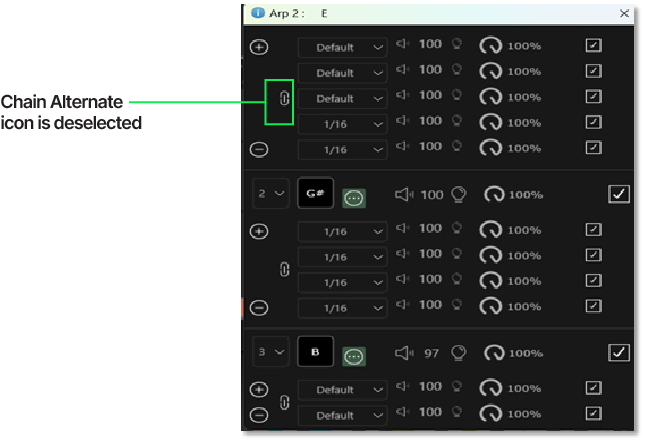Arpeggiation
What are Arpeggios? Arpeggios are ubiquitous in all genres of music over many centuries. Arpeggios provide energy, movement, flow, interest and rich colour to music creation and performance.
Note Values
In ChordWalk, note values, called Steps, are essential for creating arpeggios and can include Rests (silences). ChordWalk’s arpeggiator lets you mix note values to create varied and complex melodies and harmonies.
Note play period (Gate settings)
Gate settings in ChordWalk control how long each note or rest (step) is played. Common note values, like half notes, quarter notes, dotted notes, and triplets, have specific lengths in beats. You can adjust these lengths using Gate Settings to change the feel of your music, such as making notes short and clipped for staccato effects.
Chord Arpeggiation
An arpeggio arranges chord notes into rhythmic patterns and sequences, allowing customization of note values, lengths, orders, sequences, octave ranges, transpositions, and voicings.
Seventh Chord Arpeggios
A seventh chord arpeggio plays the individual notes of a seventh chord in a sequential pattern.
Arpeggiators in ChordWalk
In ChordWalk, using fewer, well-constructed arpeggios create better rhythms and melodies. Features like "Sync to Downbeat" enhance performance while allowing advanced customization and MIDI routing.
Arpeggiator Main Control Panel
The Master Control panel allows you to enable, add, adjust volume, stop, and sync all Arpeggiators, with features to manage metronome settings and reset Arpeggiators.
Individual Arp Settings and Controls
Start with basic settings on a single Arpeggiator pane in ChordWalk, then experiment with note patterns, octaves, and step settings, and route outputs to multiple MIDI destinations for varied and interactive arpeggio creation.
Arpeggio Individual Note Settings - Level 2
In the Arpeggio Pane, you can customize the play order, volume, and gate settings of individual notes, create rests, and experiment with different patterns, with indicators showing active notes.
Adding Arpeggiators
Now that you are comfortable using a single Arp, we will add more Arpeggiators to give your creations depth, variety, and color. To open a new Arpeggiator, click the + button labelled "Open New Arp."
Play selected Chords with Arps
Creators need the ability to play the notes of a selected chord along with the arpeggiated notes and chord patterns in real time. This feature, called Playthrough, combines harmony chords with the melodies and solos created using arpeggios.
Adding Play Patterns to Individual Notes Level 3
We will now explore the advanced controls and settings for individual notes within an Arpeggiator. Click the expand icon next to the note area labeled “Note Pattern Settings.”
Arpeggio Rhythmic Pattern Sequencer Level 3
The Pattern Sequencer enables you to arrange and customize individual notes of a chord into rhythmic patterns and sequences for arpeggiation. You can adjust the controls and settings of these individual note patterns and sequences in real-time.
Chain mode
Two mode selections are available, allowing you to change the playing cycles for the individual note flavors. The first mode is Chain Mode. When a note has the Chain/Alternate icon selected, the Arpeggiator will play all active notes within the pane before moving to the next Note Order position.
Alternate Mode Arpeggiation
The second mode is Alternate Mode. When the Chain/Alternate icon is deselected, the arpeggiator will play only one note step within the expanded note area in descending order, before moving to the next higher note order position.
Play Chord Notes simultaneously in Patterns
You can take selected notes in an arpeggio and play them simultaneously in multiple patterns and orders, adding another layer of variety and color to your creative work. You can toggle between arpeggiations and full chord patterns in real-time.
Chord Play Pattern Setup
For full chord playing, the note value in the first pattern defaults to the value set in the parent pane. Deactivated or muted notes will not be played as part of the full chord.
Transposition
Transposition generally means shifting the pitch of a note by a specific interval value. Previously, we played single-pitch arpeggios where individual notes were played in patterns and sequences within the pitch range selected in the Arpeggiator.
Transposing an Arpeggio
Remember, it is the arpeggio that is being transposed. If you want to add energy, movement, and variety to your arpeggio, follow these steps.
Beat creation using Arpeggios
GarageBand or any quality DAW will have drums, percussion and effect sounds mapped to specific MIDI notes in the lower octave ranges. In most cases, these DAWs conform to the General Midi Standard for mapping drums, percussion, and effect sounds




















